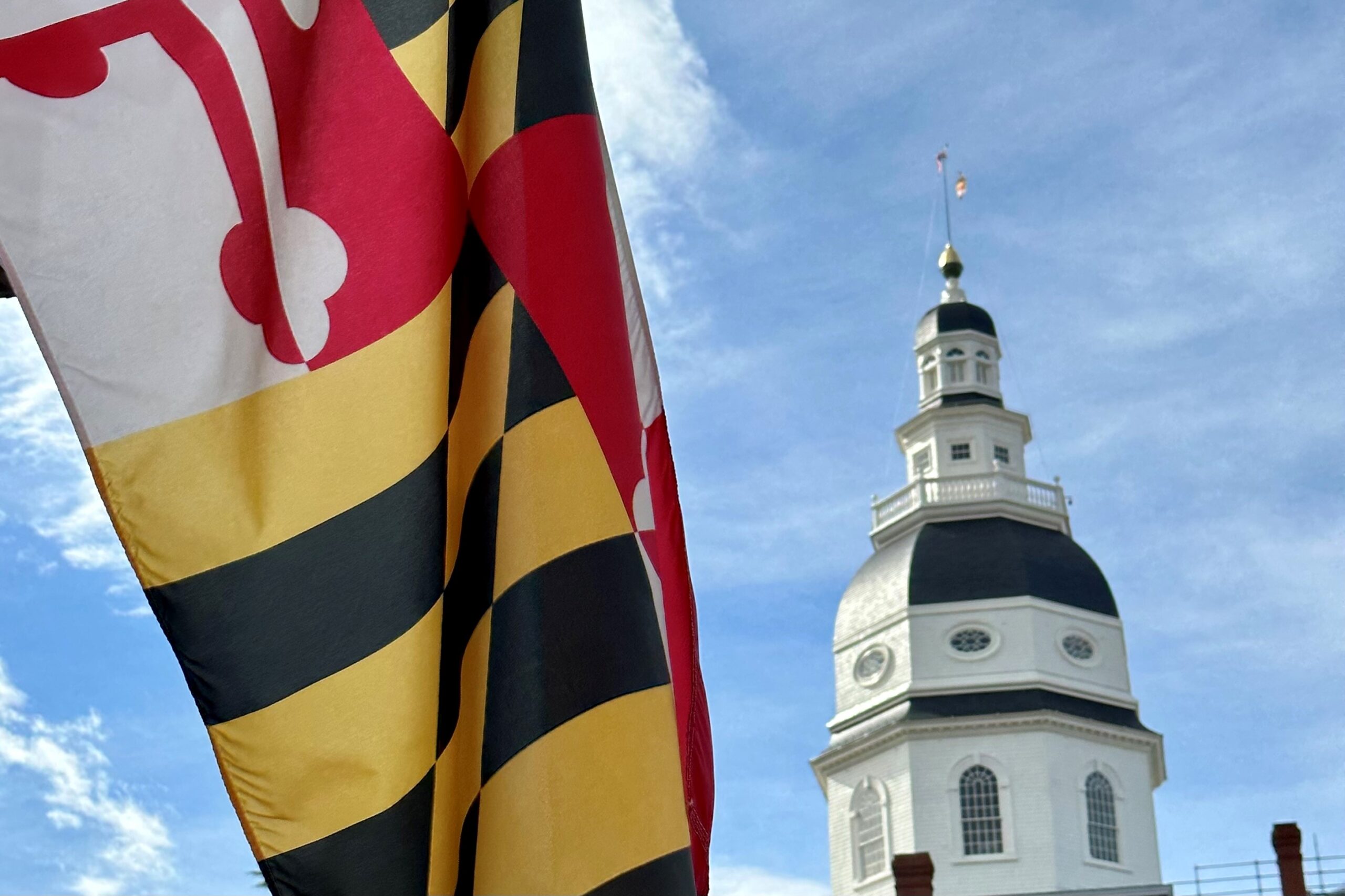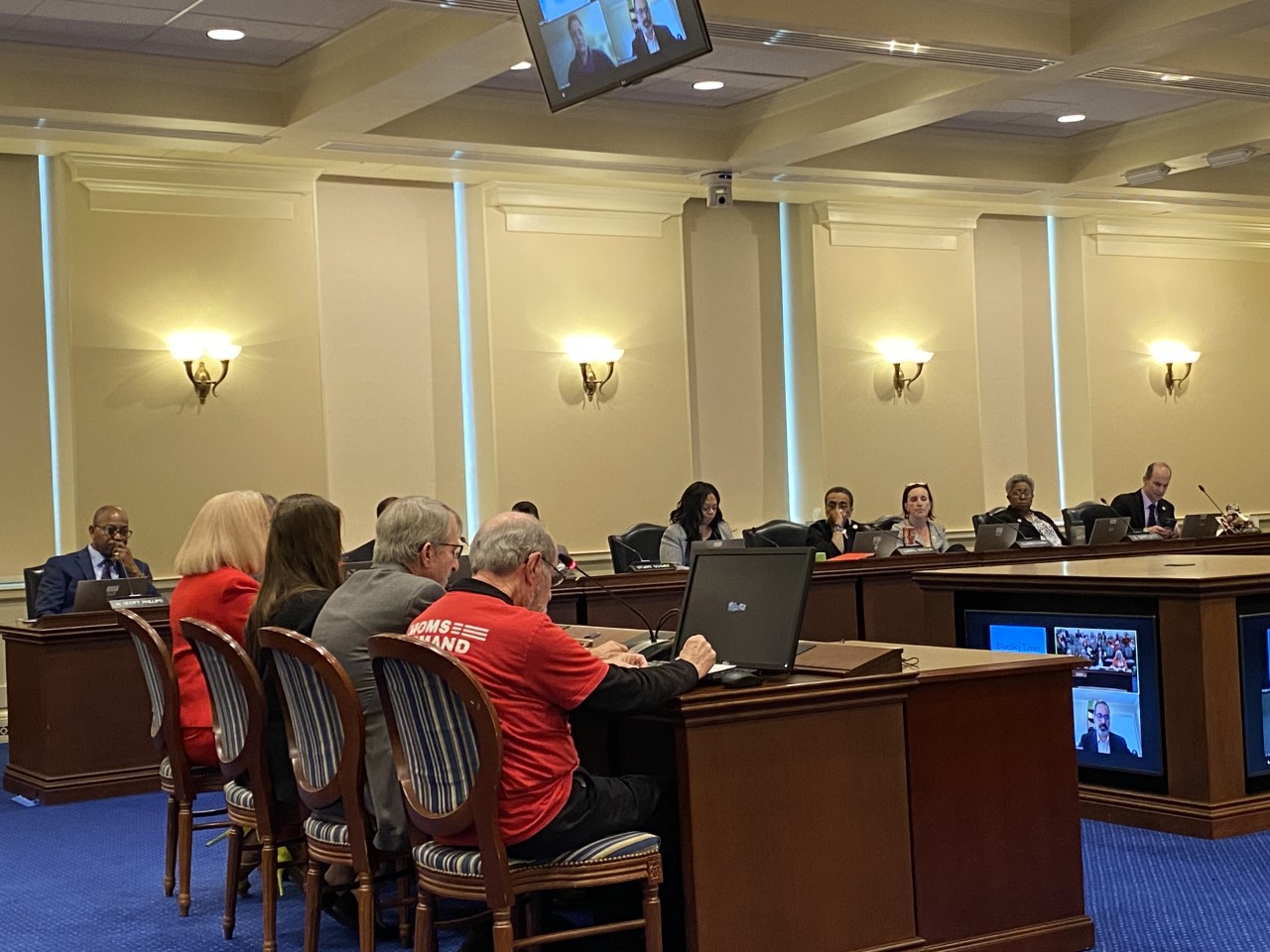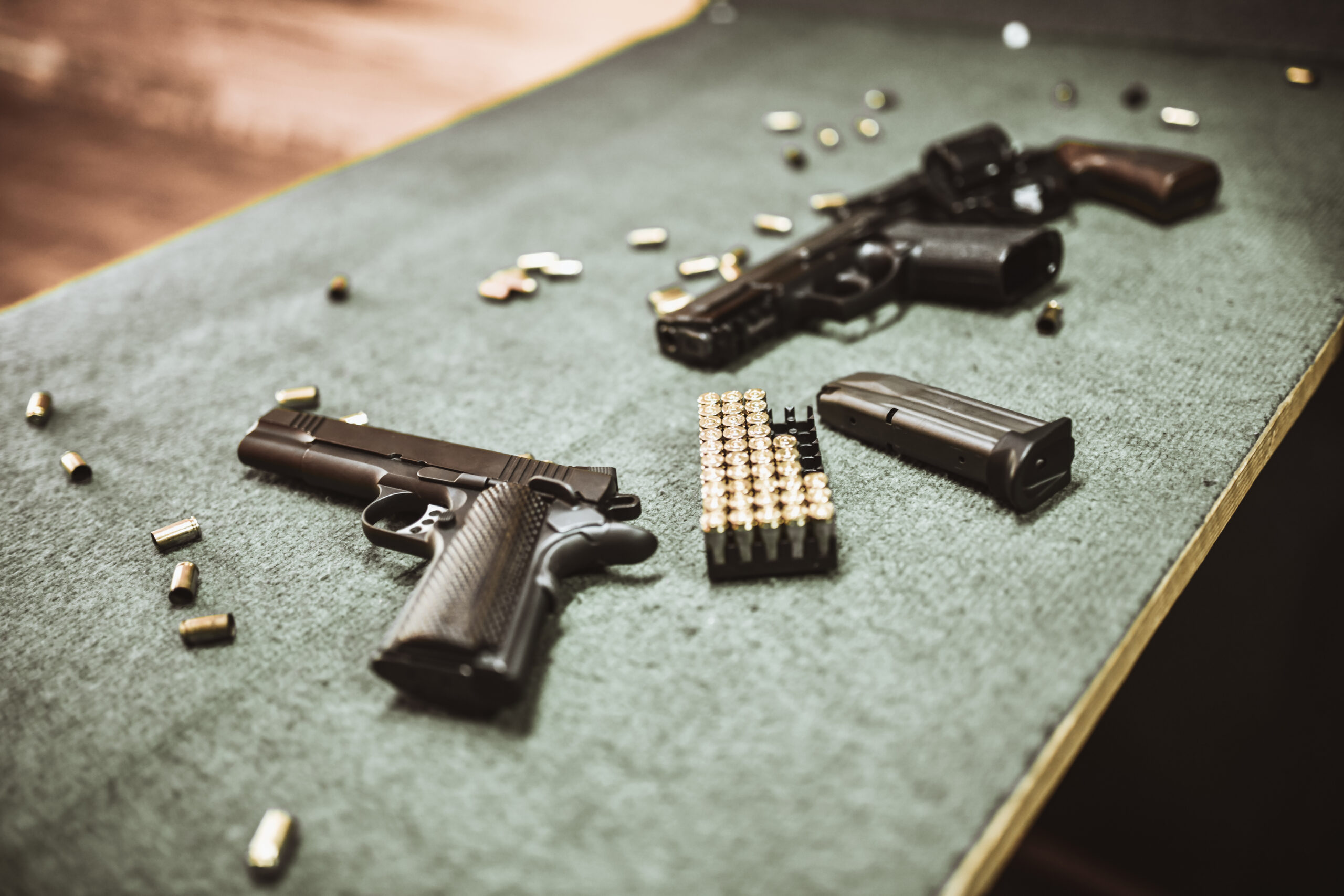Gun rights supporters, opponents return to Annapolis as Judiciary Committee considers bill to adjust concealed carry laws after SCOTUS decision

Andrea Chamblee believes stronger wear and carry gun permit laws could have prevented the shooter who killed her husband, John McNamara, and four of his Capital Gazette newspaper colleagues, from possessing a firearm on June 28, 2018.
Chamblee, a volunteer with Moms Demand Action’s Maryland chapter, said Wednesday that the shooter legally purchased the long gun used in the killings, despite a history of violence and “lackluster attendance” of anger management classes.

Four people sit at table to testify Feb. 22 before the House Judiciary Committee in support of legislation that would prohibit certain people from possessing a firearm. The bill is sponsored by Del. Luke Clippinger, chair of the committee. Photo by William J. Ford.
She was testifying before the House Judiciary Committee in support of stronger gun laws in the state.
“He was able to obtain a gun, and in doing so he changed my life, our lives and our town forever,” she said during the slightly more than two-hour hearing. “The emphasis on this bill is simple: making sure that permits needed to carry firearms are issued only to responsible gun owners. These are important safeguards because we know that more guns in more places only increases the likelihood of an argument or disagreement escalating into a shooting.”
Compared to a Senate hearing on a gun carrying permit bill Feb. 7 when several hundred people flooded Annapolis, about 20 people testified Wednesday on the bill sponsored by Del. Luke Clippinger (D-Baltimore City), chair of the committee.
The bill was borne from last summer’s U.S. Supreme Court decision that struck down New York’s law that restricted carrying concealed guns in public. Clippinger’s bill proposes to change portions of Maryland law to set out objective standards for so-called concealed carry prohibitions.
The Supreme Court ruled last year that a person no longer needed to demonstrate a special security need to obtain a license to carry a concealed gun in public, saying the requirement violated the Second Amendment. The decision in the case of New York State Rifle and Pistol Association v. Bruen — known colloquially as “Bruen” — affected gun laws in Maryland and several other states in addition to New York, where the law was challenged.
Currently in Maryland, a person cannot carry a firearm at places including legislative buildings, state parks, school property or within 1,000 feet of a demonstration in a public place.
Clippinger’s bill proposes that certain individuals should not be allowed to possess a handgun, including those on supervised probation after being convicted of a crime punishable by one year or more of imprisonment, fugitives from justice, individuals who suffer from a mental disorder, or “a habitual drunkard.”
According to a fiscal note analyzing the bill, as of Jan. 20, there were nearly 114,000 active handgun permits in the state. The figure is up from 26,199 at the end of 2021.
The document summarizes how it “generally” takes less than two days to receive results from a FBI criminal history record check and about 90 days to process, investigate and issue a permit.
The legislation proposes to double three fees: a wear-and-carry permit from $75 to $150; a renewal or subsequent application from $50 to $100; and a duplicate or modified permit from $10 to $20.
Estimated revenues may increase from $8.7 million in fiscal year 2024 to $14.1 million by fiscal year 2028, according to the fiscal note.
“We haven’t raised the fees since 1992,” Clippinger said.
Estimated expenditures to fund 55 new positions in the Maryland State Police would be $4.3 million. The funding would pay for salaries and fringe benefits for employees to vet permit applications, vehicles, computer programming and other equipment. The amount would increase to $5.4 million by fiscal year 2028, according to the note.
In addition, every permit owner would have to renew it every two years. Those exempt from this requirement include law enforcement personnel, current and former military personnel and a qualified handgun instructor.
Michael Burke, a member of the board of directors of the guns rights group Maryland Shall Issue, said doubling those fees and a regular two-year renewal “is analogous to a poll tax.”
“You’re charging a fee for a constitutional right,” he said.
Mark Pennak, president of Maryland Shall Issue, said some provisions in the bill, such as a requirement for state police to review permit applications, is already a requirement. Just as Pennak testified in the Senate hearing earlier this month, he warned that a future lawsuit could challenge the legislation.
“You are going to invite an awful lot of litigation…” he said.
Senate version
A Senate version of the legislation presents a different approach, with a focus on where people can possess firearms versus those who can own them.
Sen. Jeff Waldstreicher (D-Montgomery) sponsored legislation labeled the Gun Safety Act of 2023. He presented an updated version at a bill hearing earlier this month before the Senate Judicial Proceedings Committee.
The bill still seeks to prohibit a person from knowingly wearing, carrying or transporting a firearm within “highly sensitive places” such as schools, hospitals and libraries. Other proposed off-limits locations include theaters, polling places, zoos and shelters utilized by “homeless individuals.”
Waldstreicher, vice chair of the Judicial Proceedings Committee, said in a brief interview Wednesday that work continues to refine his bill and integrate some of Clippinger’s ideas into the Senate version.
“My hope is that some of the Senate’s ideas will similarly be integrated into his [Clippinger’s] work product,” he said. “I think the end goal is [to have] a solid, comprehensive work product that addresses gun violence in the post-Bruen world. This is our moment to address this decision. I think the entire Assembly, including both committees, have an obligation to act.”
One similarity between the Senate and House versions are that background checks would be done by the Maryland State Police.
Both bills would permit those younger than 21 to carry a firearm if hunting with an adult, participating in marksmanship or other organized training, if they’re serving in the military, or if it’s used for employment, in self-defense or against someone trespassing in a residence.
The Senate version notes an applicant who seeks a concealed carry permit must be endorsed by four people who are “reputable, not related to the applicant by blood or law” and have known that individual for at least three years before the date that person submits an application.
As of Wednesday afternoon, the updated Senate version hasn’t posted online.




 Creative Commons Attribution
Creative Commons Attribution